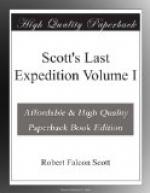Tuesday, November 7.—Camp 4. The blizzard has continued throughout last night and up to this time of writing, late in the afternoon. Starting mildly, with broken clouds, little snow, and gleams of sunshine, it grew in intensity until this forenoon, when there was heavy snowfall and the sky overspread with low nimbus cloud. In the early afternoon the snow and wind took off, and the wind is dropping now, but the sky looks very lowering and unsettled.
Last night the sky was so broken that I made certain the end of the blow had come. Towards morning the sky overhead and far to the north was quite clear. More cloud obscured the sun to the south and low heavy banks hung over Ross Island. All seemed hopeful, except that I noted with misgiving that the mantle on the Bluff was beginning to form. Two hours later the whole sky was overcast and the blizzard had fully developed.
This Tuesday evening it remains overcast, but one cannot see that the clouds are travelling fast. The Bluff mantle is a wide low bank of stratus not particularly windy in appearance; the wind is falling, but the sky still looks lowering to the south and there is a general appearance of unrest. The temperature has been -10 deg. all day.
The ponies, which had been so comparatively comfortable in the earlier stages, were hit as usual when the snow began to fall.
We have done everything possible to shelter and protect them, but there seems no way of keeping them comfortable when the snow is thick and driving fast. We men are snug and comfortable enough, but it is very evil to lie here and know that the weather is steadily sapping the strength of the beasts on which so much depends. It requires much philosophy to be cheerful on such occasions.
In the midst of the drift this forenoon the dog party came up and camped about a quarter of a mile to leeward. Meares has played too much for safety in catching us so soon, but it is satisfactory to find the dogs will pull the loads and can be driven to face such a wind as we have had. It shows that they ought to be able to help us a good deal.
The tents and sledges are badly drifted up, and the drifts behind the pony walls have been dug out several times. I shall be glad indeed to be on the march again, and oh! for a little sun. The ponies are all quite warm when covered by their rugs. Some of the fine drift snow finds its way under the rugs, and especially under the broad belly straps; this melts and makes the coat wet if allowed to remain. It is not easy to understand at first why the blizzard should have such a withering effect on the poor beasts. I think it is mainly due to the exceeding fineness of the snow particles, which, like finely divided powder, penetrate the hair of the coat and lodge in the inner warmths. Here it melts, and as water carries off the animal heat. Also, no doubt, it harasses the animals by the bombardment of the fine flying particles on tender places such as nostrils, eyes, and to lesser extent ears. In this way it continually bothers them, preventing rest. Of all things the most important for horses is that conditions should be placid whilst they stand tethered.




